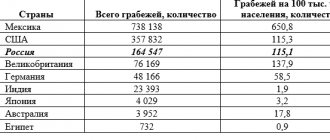Secret theft of someone else's property provides for liability under Art. 158 of the Criminal Code of the Russian Federation - from a fine to imprisonment for up to 10 years. The article applies in the case of a completed crime, in which the attacker completed his plan. An attempted theft, which was stopped for certain reasons, requires a more careful consideration under the administrative and criminal regulations of the current legislation. With the participation of an experienced lawyer, the issue can be resolved on the spot (petty theft) or the rights of the perpetrator can be defended in court.
Note!
According to paragraph 2 of Art. 31 of the Criminal Code of the Russian Federation, in case of voluntary renunciation of a crime, criminal prosecution is terminated. If the action was not completed for other reasons, then the case is considered in conjunction with the actions committed and may lead to liability under the Criminal Code of the Russian Federation or the Code of Administrative Offenses of the Russian Federation.
What is an attempt under the law?
The study of this type of act should be divided into two parts:
- find out what is recognized in the text of the Criminal Code as an attempt;
- understand attempted theft and how to define it.
In addition, one must keep in mind the “decriminalization” of theft based on certain criteria. Thus, attempted petty theft is not always prosecuted in criminal proceedings. It is customary in legislation to distinguish between damages. The criterion is an amount of two and a half thousand rubles.
Important: regardless of the amount of money that the offender covets, the act is considered a crime. In addition, the act is analyzed for compliance with the criteria established in the Criminal Code.
The definition of preparation for a criminal act is given in paragraph 30 of the Criminal Code. Namely:
"1. Preparation for a crime is the search, manufacture or adaptation by a person of means or instruments for committing a crime, the search for accomplices to a crime, conspiracy to commit a crime or other deliberate creation of conditions for the commission of a crime, if the crime was not completed due to circumstances beyond the control of this person.
- Criminal liability arises only for preparation for grave and especially grave crimes.
- An attempted crime is the intentional actions (inaction) of a person directly aimed at committing a crime, if the crime was not completed due to circumstances beyond the control of this person.”
Analysis of the text of the above article leads to the identification of objective and subjective features of a criminal act. In general they are:
- objective: preparation for committing;
- failure to complete what was planned due to circumstances beyond the control of the offender;
Attention: an important characteristic that allows an attempt to be classified as an unlawful act is the failure of plans for reasons beyond the control of the villain.
Amount of damage
The minimum amount of damage for theft and attempted theft is recognized to be an amount equal to 1 minimum wage as of the beginning of 2006, namely 1,100 rubles.
If the amount is less than the minimum, the offense is considered not criminal, but administrative. It is controlled by Article 7.21 of the Code of Administrative Offenses of Russia.
In punitive measures there are various concepts of damage, on which the choice of liability depends. These include:
- significant damage - from 5,000 rubles;
- major damage – from RUB 250,000;
- especially large damage – from RUB 1,000,000.
Characteristics of preparation for theft
When studying preparation for committing theft, two sides are also distinguished. They can be described in more detail. The main features are shown in the table:
| Traits | Characteristic | Description of actions |
| Objective | Creating conditions for theft | Obtaining funds and tools for theft:
|
| Search for accomplices | Collusion; recruitment; study of suitable personalities | |
| Other | Studying the area; developing a plan; preparing the storage area | |
| Not taking actions to their logical conclusion | For objective reasons independent of the criminal’s intentions | |
| Subjective | Premeditation | The desire to take possession of someone else's property for the benefit of:
|
Hint: inaction leading to the taking of property is also considered intentional and illegal.
Features of establishing
In the legal field, it is quite difficult to uncover and prove the preparation of theft. To do this, it is necessary not only to confirm the presence of intent on the part of the suspect. You also need to prove:
- that a person had the opportunity to take possession of someone else's property;
- he had the necessary tools for this;
- another crime was planned.
As a rule, an attempt is classified somewhat differently. It is considered that such an act has been detected if there is a time gap between the beginning of the actions of criminal elements and the final result. Moreover, bringing the intention to completion is the opportunity to appropriate someone else's property. But this does not always happen due to circumstances that the thief is not able to influence.
Example 1 . Citizens S. and A. planned the theft of valuables from the house. N. S. had to climb into the apartment through the window and hand over the property to A., who was waiting in the yard. The start of the action was planned for a time when N. was at work and no one was home. And so they did. However, N. fell ill and returned from service earlier than planned.
N. caught the criminal in the apartment when he collected valuables near the open window. He detained the villain and called the police. Thus, the criminal act could not be completed. The actions of S. and A. were qualified as an attempt. After all, they could not take possession of the property.
Example 2 . D. worked in a warehouse. He planned to steal goods for the purpose of enrichment. He became friends with the watchman I. due to the joint drinking of alcoholic beverages. I found out when I. would start his shift again and arrived at the warehouse in his personal car, taking two bottles of vodka. He handed the alcohol to a friend, explaining his intention.
I. did not prevent the theft. D. loaded the goods into the car, but was unable to take it out of the territory. The comrades were taken by surprise by the head of security who came to check on I. This act was classified as an assassination attempt. Moreover, both were found guilty. D. organized the crime, I. contributed to it through his inaction, although he was aware of the illegality of the actions.
Punishment and its types
Paragraph 30 of the Criminal Code states that preparation for serious and especially serious criminal acts is punishable.
Moreover, the incompleteness of actions does not affect the application of the relevant article. Therefore, in order to understand the penalties for preparing for theft, it is necessary to refer to paragraph 158 of the Criminal Code “Theft”. Download for viewing and printing: Article 30 of the Criminal Code of the Russian Federation of June 13, 1996 N63-FZ
Article 31 of the Criminal Code of the Russian Federation dated June 13, 1996 N63-FZ
Article 66 of the Criminal Code of the Russian Federation dated June 13, 1996 N63-FZ
Article 158 of the Criminal Code of the Russian Federation dated June 13, 1996 N 63-FZ
This article provides the parameters of grand theft. They are:
- large - up to 250 thousand rubles;
- especially large - from 1 million rubles.
Thus, punishment is awarded as for a completed criminal act, despite the lack of benefit from it. Moreover, in court the provision of paragraph 66 of the Criminal Code is applied. This limits the maximum period of imprisonment to ¾ of what is established in the relevant article.
Hint: the maximum punishment under paragraph 158 reaches ten years in prison with a fine of up to a million rubles.
In addition, the following aggravating circumstances are taken into account in the trial:
- group conspiracy;
- commission of a crime by a person with an outstanding criminal record;
- especially large size;
- causing significant damage;
- committing other criminal acts (breaking, entering, etc.).
Attention: the amount of damage is not indicated in numerical values.
It is assessed according to the income level of the victim. The court is also obliged to evaluate the circumstances that prevented the theft from being brought to its logical conclusion. They are analyzed from the point of view of social danger. For example, two thieves tried to steal DVRs from cars:
- one was unable to perform the act due to the alarm going off;
- the second was stopped by ignorance of the technical details of connecting the device to the vehicle's power supply system.
The first reason is much more dangerous than the second. Consequently, the thief will receive a greater punishment under equal conditions.
Article of the Criminal Code of the Russian Federation: attempted theft and its definition
In the Russian Criminal Code there is a concept of attempted theft. The law qualifies it in the case when the person committing the theft did not complete his criminal intent. This action is considered as an unfinished crime, but criminal punishment for its commission is still provided for by the Criminal Code.
Theft can be classified as a completed crime only when the attacker managed to dispose of or use the stolen property. If the thief only wanted to steal someone else’s property, but he failed or was unable to dispose of the stolen property, this crime will be considered by the court as an attempt to commit theft.
Refusal to commit theft
The essence of voluntary renunciation of criminal intent is explained in paragraph 31 of the Criminal Code. Various actions are recognized as such:
- a person’s cessation of preparatory measures even before causing damage to the victim;
- refusal to bring the act to its logical conclusion;
- timely notification of law enforcement agencies about impending theft.
Attention: it is not enough to inform the police about criminal plans.
If the information does not interfere with their implementation, then paragraph 31 in the described part will not be applied during the investigation. The fifth paragraph states that the initiative of the criminal's accomplice will be regarded as a mitigating circumstance. Example 3 . Let's return to the above situation with employee D. and watchman I. Let's say that I., realizing the criminality of D.'s intentions and his responsibility, called the police. But law enforcement officers did not have time to detain the thief. He managed to sell the exported goods and spend part of the profit. There is a theft. Moreover, during the investigation, the guilt of both accomplices will be classified. I. is guilty of not interfering with D.’s plans immediately when he learned about them.
When investigating unfinished theft, the reasons for refusing it are identified. To apply paragraph 31, it is necessary to prove that the refusal occurred at the thief’s own will, and not under the pressure of circumstances.
Example 4 . R. decided to steal valuables from the safe. He climbed into the house, but was unable to open the vault. He had to leave the scene of the crime without causing damage to the owner. This development of events does not save us from responsibility. The subjective part of the guilt can be proven by the presence of plans to try again. In addition, objectively, the failure to complete the theft is due to the inability to cope with the lock.
According to the text of paragraph 31 of the Criminal Code, voluntary renunciation of criminal intentions exempts from criminal prosecution. However, it does not relieve responsibility for related violations of the law. A person will be convicted for the actions that he committed before realizing his guilt.
Example 5 . O. decided to steal a large sum of money from his relative L. He repeatedly came to L. in order to find out the situation and notice the place where he kept the funds. Having learned that L. was leaving for a week on a business trip, O. broke the door lock and entered the apartment. However, he did not take the money. At the last minute, he abandoned his criminal intent. Consequently, O. is not guilty of theft, but he will have to answer for breaking and entering.
Theft on a small scale
Most often, law enforcement officers are faced with the theft of items of small value or small amounts of money.
Such an offense is not subject to punishment under the Criminal Code. Responsibility for it applies according to paragraph 7.2 of the Code of Administrative Offences. In this article, the amount of stolen goods is limited to two and a half thousand rubles (maximum). Moreover, penalties are divided depending on the specific cost of damage as follows:
- up to one thousand rubles;
- from 1,000.0 to 2,500.0 rub.
Such an offense is punished in various ways. They are shown in the table:
| Amount of damage | Fine | Arrest (days) | Mandatory work (hours) |
| Up to 1,000.0 | Fivefold, but not less than 1,000.0 | Up to 15 | Up to 50 |
| Up to 2,500.0 | Also, but not less than 3,000.0 | From 10 to 15 | Up to 120 |
When investigating petty theft, all the circumstances of the case are examined. The following are considered aggravating:
- conspiracy of persons;
- damage to property;
- entering a room or home;
- commission of an offense by a previously convicted person.
Important: petty theft can be punished under the Code of Administrative Offenses, and other offenses can be classified under the paragraphs of the Criminal Code.
Example 6 . N., being in the same company with M., heard the latter’s boasting about a successful deal. M. told his friends that he had become the owner of a large sum of money. N. decided to steal the funds. He followed M. and found out his residential address. After waiting until the morning, when the owner of the house left for work, he climbed into the apartment. After searching the premises, I found neither money nor valuables. I grabbed a watch from the apartment that looked expensive.
The value of the stolen property turned out to be insignificant, only 500.0 rubles. However, M. was found guilty of breaking into a residential premises. He was tried under paragraph 158 of the Criminal Code (Part 1).
Incomplete shoplifting
This is the most common case of petty theft.
Attackers do not always try to take over a company's property for selfish reasons. Often such actions are carried out out of mischief. However, the reason in this case does not relieve guilt. When an intruder is caught, security must call the police to investigate the theft. However, this does not always happen. As a rule, the first step is to estimate the value of the stolen property. If it does not reach 2.5 thousand rubles, then the security acts according to the instructions of the supermarket owner. Such an offense is punishable by penalties under the Code of Administrative Offences, which is known to the employees of the institution. They act according to the situation:
- make up a description of the attacker;
- decide to involve the police.
At the same time, security officers take into account the main features of the application of punishments described above. Law enforcement officers are involved if serious damage could be caused to the enterprise. That is, the value of the stolen property is high. In other cases, the goods are taken away and the attacker is released. At this moment, the thief’s voluntary repentance will influence the security’s decision.
The police are usually involved in the investigation in the following situations:
- participation in the theft of a group of persons was revealed;
- the caught thief has obvious antisocial tendencies;
- a man was caught who had previously been caught stealing.
Attention: not calling the police when detecting theft in a store of any size is a reckless act. Security guards may be harmed if information reaches law enforcement.
About forgetfulness of buyers and malicious intent
Nowadays, a common situation is when a person takes an item in a supermarket and forgets about it when he goes to the checkout.
Psychologically, this behavior is understandable, because there are a lot of goods in the hall that distract attention. It’s easy to forget where shopping began. Theft is detected after the client has paid for the purchase. The security is not inclined to believe the attacker's explanations. And it is extremely difficult to prove the absence of selfish intent in this situation. If the police are involved, then such forgetfulness ends in a lawsuit. The price of unpaid goods affects only the size of the penalty and its qualification. Sometimes forgetfulness can lead to criminal prosecution. Shoppers should be more careful in supermarkets.
Important: only the court can punish petty and any other theft. It is illegal for supermarket employees to demand payment of a fine.
Attempted shoplifting
The Criminal Code of Russia provides punishment for attempted theft in accordance with Art. 158. It states that deliberate theft entails criminal consequences. If the cost of the stolen property is less than a thousand rubles, this theft is considered an administrative offense and belongs to the category of minor ones.
If such an attempt to steal is made, only administrative liability can arise. When the criminal did not have time to use what he stole, for example, the stolen item was confiscated by a security guard when leaving the store, the offender will not even be brought to administrative responsibility. If the crime is classified as completed (that is, the thief manages to use the stolen property), he will have to pay a fine five times the cost of the stolen item, or will be arrested for fifteen days.








